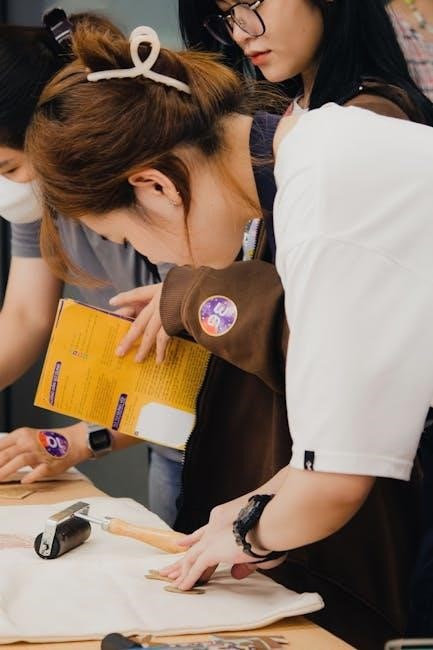Understanding the Legal Status of a Resident Alien
A resident alien holds a specific legal status, granting them the right to live and work in a country under immigration laws. Obtaining and maintaining this status requires adherence to visa requirements and regulations. Understanding the distinctions between permanent and temporary residency is crucial for compliance and future planning.
Definition and Classification of Resident Aliens
A resident alien is an individual granted legal permission to reside in a country, distinguishing them from citizens. They are classified as permanent or temporary residents, with varying rights and obligations. Permanent residents hold visas like green cards, while temporary residents may include students or workers. Non-resident aliens, in contrast, lack permanent domicile in the host country.
Obtaining and Maintaining Legal Residency
Obtaining legal residency involves applying for visas or green cards, meeting eligibility criteria, and completing required documentation. To maintain status, residents must renew documents, comply with regulations, and avoid violations. Failure to adhere can lead to legal consequences, emphasizing the importance of understanding and following residency requirements meticulously to ensure continued legal standing.
Rights and Responsibilities of Resident Aliens
Resident aliens enjoy rights such as legal employment, property ownership, and protection under the law. They must also fulfill responsibilities, including obeying local laws, paying taxes, and maintaining valid residency status. Understanding these obligations ensures compliance and integration into the host society while preserving their legal standing and privileges as resident aliens.

Cultural Adaptation for Resident Aliens
Cultural adaptation involves embracing local customs, learning the language, and understanding social norms. These steps foster integration and mutual respect, easing the transition for resident aliens.
Understanding Local Customs and Traditions
Adapting to local customs and traditions is essential for resident aliens. From greetings to meal etiquette, understanding these practices helps build bridges with the community. Learning cultural norms fosters mutual respect and eases integration, making daily interactions smoother and more meaningful. This guidebook approach ensures a harmonious transition into societal life.
Learning the Local Language and Communication Styles
Mastering the local language is vital for integration. Understanding dialects, slang, and non-verbal cues enhances communication. Cultural context influences speech, so studying these aspects ensures clearer interactions. Enroll in language classes or use online tools to improve proficiency, fostering better connections and daily interactions within the community. This step is key to a seamless adaptation process.
Adapting to Social Norms and Etiquette
Understanding local customs and unwritten rules is essential. Learn gestures, greetings, and community practices to avoid unintended offense. Cultural differences may influence behavior, so observing and respecting these norms fosters trust. Adapting to social etiquette helps build connections and ensures a harmonious integration into the host society.
Technology and Communication for Resident Aliens
Accessing Earth’s technology involves understanding digital tools and platforms. Learning human communication styles aids in effective interaction. Translation tools help bridge language gaps, ensuring clear and efficient exchanges.
Accessing and Using Earth’s Technology
Resident aliens can access Earth’s technology by familiarizing themselves with digital tools. Smartphones and computers are essential for daily tasks. Understanding software applications and online platforms aids in communication and navigation. The instruction manuals from the Resident Alien TV show intros serve as humorous guides, highlighting the importance of mastering these tools for seamless integration into human society.
Understanding Human Communication Styles
Human communication involves both verbal and non-verbal cues. Body language, tone, and context play significant roles. Resident aliens must learn to interpret these signals to avoid misunderstandings. Observing cultural norms and practicing active listening can enhance interaction. Universal translation tools can assist, but understanding unspoken rules is key to effective communication and integration into human society seamlessly.
Utilizing Universal Translation Tools
Universal translation tools are essential for bridging language gaps. Real-time translation devices and apps enable effective communication. These tools can interpret spoken and written languages, facilitating daily interactions. They also help in understanding cultural references and nuances, ensuring clear and accurate exchanges. Reliability in emergencies makes them indispensable for resident aliens navigating human society. Use them wisely to enhance your experience.
Health and Safety for Resident Aliens
Understanding human physiology is crucial for resident aliens. Accessing healthcare services and knowing emergency protocols ensures well-being. Familiarity with medical practices and safety measures is vital for a secure experience on Earth.
Understanding Human Physiology and Medical Needs
Resident aliens must grasp human biology and health requirements. Differences in alien and human physiology may require tailored medical approaches; Understanding Earth’s healthcare systems and common ailments ensures effective treatment and prevention, promoting long-term well-being and integration into human society seamlessly.
Accessing Healthcare Services
Resident aliens must research local healthcare systems and insurance options. Understanding coverage requirements ensures access to medical services. Familiarizing oneself with emergency procedures and preventive care is essential. Seeking guidance from healthcare providers helps navigate the system effectively, ensuring proper medical attention when needed.
Handling Emergency Situations
Resident aliens must be prepared for emergencies by knowing local emergency numbers and procedures. Understanding evacuation protocols and having essential documents readily accessible is crucial. Familiarizing oneself with cultural differences in crisis response ensures effective communication and timely action during critical situations.

Financial Systems for Resident Aliens
Resident aliens must understand Earth’s financial systems, including currency, banking, and managing accounts. This knowledge aids in effective financial planning and integration into the economy.
Understanding Earth’s Currency and Banking Systems
Resident aliens must familiarize themselves with Earth’s currency exchange, digital payment methods, and banking regulations. Opening a bank account requires identification, often including a valid visa or residency permit. Managing finances effectively involves understanding local banking norms and ensuring compliance with financial regulations to maintain legal residency and economic stability.
Opening a Bank Account and Managing Finances
Resident aliens must provide valid identification, such as a visa or residency permit, to open a bank account. Managing finances involves understanding local banking norms, setting up direct deposits, and monitoring transactions. Maintaining accurate financial records is essential for tax compliance and long-term financial stability in a new country.
Paying Taxes and Understanding Fiscal Responsibilities
Resident aliens are required to pay taxes on income earned within the host country. Understanding tax-filing status (resident or non-resident) is crucial. Filing annual tax returns and disclosing all income ensures compliance; Failure to meet fiscal obligations may result in legal consequences. Consulting a tax professional can help navigate complex regulations and avoid penalties.

Community Engagement for Resident Aliens
Building relationships with local communities fosters integration and mutual understanding. Participating in cultural events and volunteering enhances social bonds. Understanding community roles helps resident aliens contribute meaningfully to society.
Building Relationships with Local Communities
Building relationships with local communities is vital for integration. Volunteering and participating in local events foster connections and understanding. Engaging with neighbors and joining community groups helps resident aliens feel a sense of belonging and mutual respect, creating a supportive environment for their adjustment to a new culture and lifestyle.
Participating in Social and Cultural Events
Engaging in local festivals, traditions, and gatherings helps resident aliens connect with their new community. Attending these events fosters cultural understanding and mutual respect. Participating actively in social activities builds bridges, enhances integration, and creates opportunities for meaningful interactions, enriching both personal and communal experiences in the host country.
Understanding Community Roles and Contributions
Recognizing the roles within a community helps resident aliens contribute meaningfully. Volunteering, joining local groups, and engaging in public services fosters integration. Understanding how individuals and organizations support the community enables resident aliens to participate actively, enhancing their sense of belonging and contributing to the collective well-being of their new society.

Transportation and Mobility for Resident Aliens
Familiarizing yourself with Earth’s transportation systems is essential. Obtaining a driver’s license or exploring alternative mobility options like public transit ensures independence and ease of movement in your new environment.
Familiarizing Yourself with Earth’s Transportation Systems
The resident alien instruction manual highlights Earth’s diverse transportation options, including public transit, ride-sharing, and biking. Understanding these systems is key to navigating efficiently. Additionally, the manual provides tips on using universal translation tools to decipher route information and signs, ensuring seamless mobility for resident aliens adapting to their new environment.
Obtaining a Driver’s License or Alternative Mobility Options
Securing a driver’s license typically requires valid identification, residency proof, and a vision test. For those who prefer not to drive, public transit and ride-sharing services are convenient alternatives. The manual also suggests using universal translation tools to understand local transportation signs and instructions, ensuring smooth navigation for resident aliens.
Navigating Public Transportation
Understanding the public transit system is essential for resident aliens. Translation tools can help decipher signs and schedules. Purchasing tickets or passes is typically straightforward, with options for contactless payments. Familiarizing yourself with routes and timetables ensures efficient travel. Downloading transit apps or maps can simplify navigation, making daily commuting more manageable and stress-free for newcomers.

Work and Education for Resident Aliens
Resident aliens can access various employment opportunities and educational institutions. Understanding the job market and workplace culture is crucial for integration and career advancement. Additionally, enrolling in local schools or universities requires proper documentation and adherence to enrollment procedures, ensuring a smooth transition into professional and academic life.
Finding Employment Opportunities
Resident aliens can explore diverse job opportunities by understanding the local job market and tailoring resumes to meet employer expectations. Networking and applying through official channels are essential. Many industries welcome resident aliens, provided they possess the necessary skills and documentation. Adapting to workplace culture and communication styles ensures successful integration into the workforce.
Enrolling in Educational Institutions
Resident aliens can enroll in schools, colleges, or universities by researching institutions and understanding admission requirements. Ensuring documentation, such as visas or residency proof, is crucial. Language proficiency tests may be needed for non-native speakers. Securing a student visa and understanding academic expectations helps ease the transition into the educational system.
Understanding Workplace Culture and Etiquette
Adapting to workplace culture involves understanding professionalism, punctuality, and formality levels. Observing colleagues’ behavior and communication styles helps blend in. Be prepared to learn local customs and etiquette, such as handshake protocols or meeting practices. Demonstrating respect for cultural differences fosters a positive work environment and ensures smooth integration into the team.

Crisis Management for Resident Aliens
- Prepare for emergencies by having emergency contacts and legal documents accessible.
- Stay informed about local laws and know your rights to avoid misunderstandings.
- Understand the process for handling legal or immigration issues promptly.
Handling Legal or Immigration Issues
Resident aliens must consult immigration attorneys for legal disputes or visa complications. Stay informed about rights and local laws to avoid misunderstandings. Organize documents like visas and permits for quick access. Know your rights during interactions with authorities and seek community resources for guidance. Act promptly to resolve issues before they escalate.
Preparing for Natural Disasters or Emergencies
Resident aliens should create emergency kits with essentials like water, food, and documents; Familiarize yourself with local warning systems and evacuation routes. Stay informed about weather alerts and community resources. Have a communication plan to connect with family and authorities. Know emergency contact numbers and nearby shelters for safety.
Resolving Conflicts or Misunderstandings
Effective communication is key to resolving conflicts. Cultural differences may lead to misunderstandings, so staying calm and seeking clarification is essential. Mediation services or legal advice can help address disputes. Documenting incidents and understanding local conflict resolution practices ensures fair outcomes. Respectful dialogue fosters mutual understanding and maintains harmony in diverse communities.

Concluding Thoughts for Resident Aliens
Embracing a new life as a resident alien requires adaptability and resilience. Integration into the community and understanding local customs is vital for a smooth transition and future success.
Final Tips for a Smooth Transition
For a seamless transition, stay informed about legal requirements and local customs. Build relationships with the community and learn the local language to enhance communication. Be prepared for emergencies and embrace cultural differences. Seeking support networks and understanding your rights can significantly ease your adaptation to life as a resident alien.
Planning for the Future as a Resident Alien
Plan ahead by securing a stable legal status and understanding long-term residency options. Set clear personal and professional goals, and explore opportunities for integration. Stay informed about immigration policies and consider future commitments like homeownership or family planning. Building a support network and maintaining financial stability will also aid in creating a secure future as a resident alien.
